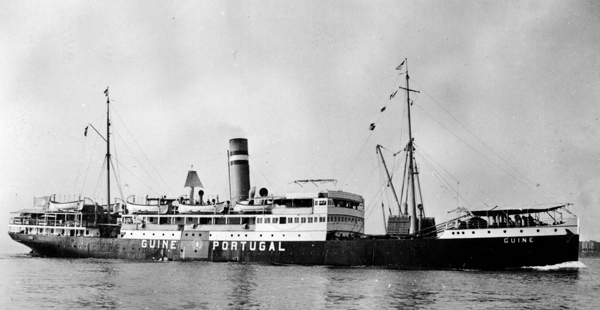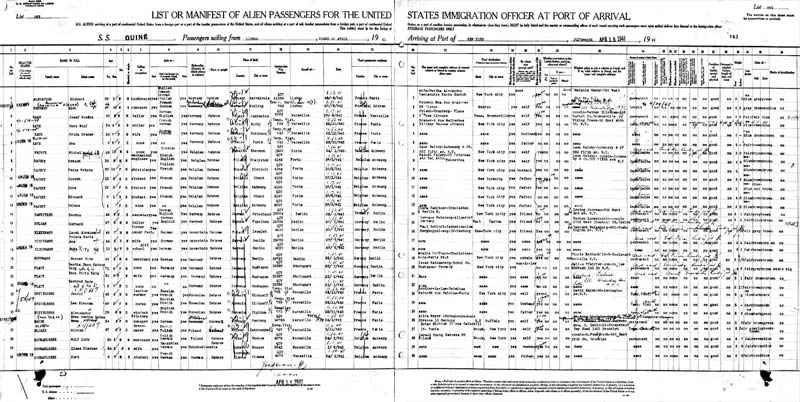H.W. ("Bill") Katz.
H.W. ("Bill") Katz was born on 31 December, 1906, to Aron Selig and Golda (Goldy) in Rudki, Austria-Hungary (after WW1: Poland, today: Ukraine).
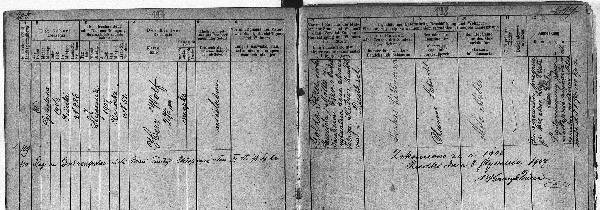
Birth record of Herz Wolf (William) Katz, 1906
Source: AGAD (Central Archives of Historical Records in Warsaw)
(Via Yossi Mund)
He was named Herz Wolf Katz, after his grandfather. Later, in the United States, he would change his name to Henry William Katz - H.W. Katz.
In July 1908, Michel, Bill's younger sibling, was born.
Germany
1914: The family fled Poland during WWI and came to Gera, Germany, where Aron's brother Mathes lived with his wife and daugher.
This flight from Poland would later inspire his novel The Fishmans.
1916: November 6, 1916: Goldy, Bill's mother, died of childbirth fever after giving birth to a third boy. She was about thirty years old. Her baby died shortly afterwards.
"My father was around 7 or 8 years old at the time his mother Goldy died around the age of 30 in childbirth, and was stricken by the loss. Indeed, in some sense, it remained with him always." (Eve Katz)
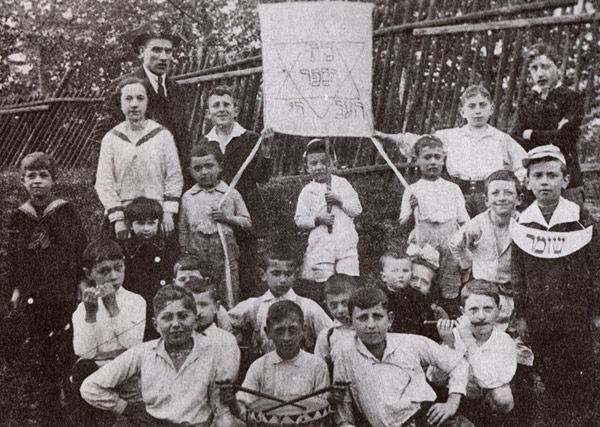
Group photo Jewish School, ca.1922*
Front row, left: Willi (H.W.) Katz. Back row, second from right, holding flag: Michael Katz.
Photo from "Juden in Gera I", Werner Simsohn.
Simsohn dates this photo as ca 1918; As noted by Martin Reisler, son of Arno Reisler, the correct date is probably ca 1922.
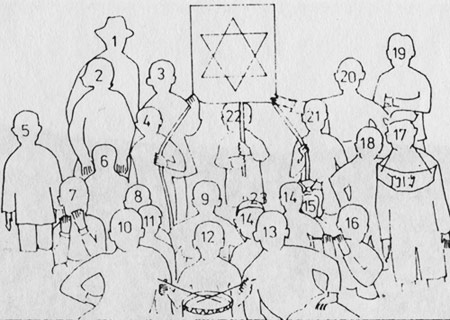
1: Herr Igler, 2: Rosa Weiss, 3: Abraham Mostovicz*, 4: Jakob Frost*, 5: Josef Scharf, 6: Anna Weiss, 7: Josef Malachowsky*, 8 (?), 9: Israel Tropper, 10: Willi Katz, 11: Josef Jahr, 12: Emil Tropper, 13: Max Hirschhorn, 14: Arno Reisler, 15: Erna Reisler, 16: Oskar Greidinger, 17: Dagobert Birnbaum*, 18: Max Reisler, 19: Jacob Greidinger, 20: Michael Katz, 21: Shomak Antmann, 22: Norbert Spiegel*, 23: Hans Hirschhorn.
Note: Aside from Willi (Bill) and Michael Katz, many of these names are familiar:
*Abraham Mostovicz was the older brother of Esther Mostovicz (later Flieg), a friend of my mother.
*Jakob Frost was the brother of Adolf (Adi), and Regina, both of them friends of my mother.
*Josef Malachowsky was the older brother of Julius ("Julle"), a friend of my uncle Yitzhack Katz, with whom he emigrated to Kibbutz Degania.
*Dagobert Birnbaum, cousin of Ruth Birnbaum (married name: Lessing), a friend of my mother.
*Norbert Spiegel was the brother of Siegmund Spiegel, another friend of my mother.
19??: Bill's father, Aron, remarried. His second wife was Gustl Katz, from Krakow, Poland.
"Aron was “talked into marriage” with a woman from Munich named Gustl, née Katz. She was extremely orthodox and my father (Bill) was not happy in that home. He moved out to a furnished room at the age of 15 or 16" (Eve)
From this second marriage, a boy Saul was born.
"... Saul was many years younger than my father and I do not think they ever came to know one another well." (Eve)
Bill did not get along with his stepmother and avoided going home, preferring to stay with relatives and friends instead.
Friedel:
"Bill couldn't stand his stepmother. She was not just religious, she was fanatic - she was hyper religious.
"Any chance he could get out of the house, he'd go and would spend most of his time with his aunts - like Toni's mother. He ate his meals there, he'd run out of the house the minute he could. "
Toni remembered that whenever he came back to Gera, Bill would stay in Leo and Frida's apartment instead of going home.
Siegmund Spiegel also remembers Bill and his brother Michel staying at his parents' house for a while.
"My father moved out of his home as a teenager, something almost unheard of. He spent much time in Mary’s home and often ate in Leo and Frida’s home."
Friedel:
"Michel made peace with his stepmother and stayed home, whereas Bill left home very early, when he was 16 - then Bill went to live in Berlin, and worked for Die Welt Am Montag, a left-wing newspaper."
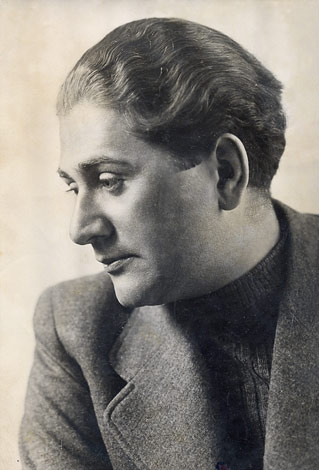
H.W. ("Bill") Katz - 1931.
1932 - 1933: Bill became the youngest editor of Die Welt Am Montag, a left-wing magazine in Berlin.
From Ghetto writing: traditional and Eastern Jewry in German-Jewish Literature from Heine to Hilsenrath by Anne Fuchs, Florian Krobb
Katz became involved in the work of the local Social Democratic youth group Sozialistische Arbeiterjugend and soon began writing short stories, poems, and reports dealing with the workers' lot for local newspapers.
In 1932, this interest in journalism led to his employment as the youngest editor of the Berlin newspaper Die Welt am Montag, a position, however, which he had to abandon less than a year later when forced into exile in France after Hitler's accession to power.
France
1933: After Hitler's victory, Bill was blacklisted for being an engaged journalist, a Social Democrat, and a Jew. He fled Germany and arrived in Lyon, France, on May 17, 1933, one week to the day after the book burning. He was twenty-six years old.
There, he met his future wife Friedel, another refugee from Heilbronn, Germany.
Friedel:
"I was a young law student in Berlin when Hitler came to power. Like so many, I fled the country and went to Lyon, France in 1933. "
"Many refugees went to Lyon. They knew about it by word of mouth. "
"Bill was like the "Don Juan" of the refugees - everybody fell for him. I knew about him because I was interested in politics and literature. I'd studied in Berlin when he was an editor, I'd read everything he wrote, I read his poems... And we met in Lyon."
"Later, when we tried to get married, we found out that the French would not let us get married because we were "stateless" - the Germans had taken our papers."
"Now the Polish Consul of Leipzig - Tadeusz Brzezinski - was known to give papers out to Jews, which weren't quite the truth, but they helped them."
"So Bill wrote to his father Aron who was still in Germany, asking him for help. His father went to Leipzig to see the Polish Consul - even though they weren't Polish (Friedel was born in Germany, and Bill was born before Poland was reborn, when his hometown was still part of Austria-Hungary.) "
"The Consul provided Aron with two Polish passports, one for me and one for H. W. Katz. These passports allowed us to get married. "
"This man saved our lives. Thanks to him we were somebody - we had passports. At that time, if you were stateless, you were nothing. For a refugee a passport is a lifesaver..."
1936: Bill and Friedel got married.
In France, Bill continued to write and contributed to Die Zukunft, Das Neue Tage-Buch, Das Wort, Internationale Literatur.
To make a living, he washed dishes, worked as a tailor, foreign language translator, German teacher.
From "Ghetto writing: traditional and Eastern Jewry in German-Jewish Literature from Heine to Hilsenrath"
"Highly disappointed with the left-wing parties' lack of resistance and with the German population's acceptance of Hitler, Katz turned to writing literature in the few hours remaining after each day's battle to secure his livelihood. He worked as a cutter of leather coats, a German tutor, and a translator among other things. In his imagination, he returned to the world of his early childhood, the Galician shtetl. (...)"
"His first novel, Die Fischmanns (...) is the first part of a Jewish family saga starting in the Eastern provinces of the Habsburg Empire at the turn of the century and closing with the life and fate of the Fischmanns in Germany at the end of the Weimar Republic as depicted in his second novel, Schlossgasse 21."
1937: Bill was awarded the Heinrich Heine Prize from the S.D.S. (Schutzverband Deutscher Schriftsteller Im Exil) for his novel Die Fischmans.
Expecting the birth of their child, Friedel and Bill moved to Paris.
1938: July 2, their daughter Eve was born in Paris.
Bill’s first novel was published in England, Holland and USA as "The Fishmans" - "The early childhood of a Jewish boy living in an environment of pre-war anti-Semitism in a Galician village."
WWII
1939, September: After Hitler's invasion of France, Bill volunteered to serve with the French army. As France didn't allow foreigners to fight with the regular French army on French soil, he was put in the Foreign Legion.
His regiment was sent to the front lines and was decimated - out of 3000 soldiers, less than 300 survived. After the war, Bill would be awarded the "Croix de Guerre".
In June 1940, the Germans were approaching Paris. Bill was in the army, Friedel and her baby Eve were in Paris.
Friedel:
"So I went to my rich relatives in Paris who had promised Bill that should anything happen, I should not worry, my French aunt had said: 'We'll take care of Friedel and the baby, don't worry, they will be with us.'"
"So when I knew that the Germans were approaching Paris, I went to my uncle and my aunt, and I came in front of the house and I saw a big truck, and two men loading up precious rugs and precious things... So anyway, I went up in the apartment, with my baby in my arms, saw my uncle, and I saw them picking the gold and the silver and the rugs - they were very well-to-do..."
"They said there was no room in the truck for us - forget about it - they had to put their own carpets and silverware and gold in it. So that was it."
"So I went home - my friends in the neighborhood, everybody had left, nobody was there..."
"By nature I'm a shy person, but I knew that in my building lived a relative of Leon Blum - so I figured they can't be of the right - they must be of the left, so I rang the bell. Nobody answered. I rang the bell, again, again, and a young woman answered. I told her my story, and she said - 'I live with my aunt here - we are leaving tomorrow morning, get ready, I will convince her to take you.'"
"Her aunt did not want to be pestered with a small child. I said, 'she's very clean, there will be nothing to be afraid of.'"
"In short, they took me into their car the next morning, we left at 4 in the morning - it was still night. I left my apartment with everything in it, I took my papers and I took Eve's papers, and we went to Orleans."
"I put on slacks because I thought that would be more practical for the road. But later on in little villages, people immediately knew that I was from 'there' - because peasants didn't wear slacks..."
"And I packed a backpack with Eve's blanket and her little pot, because I said to myself, you want to keep her clean. "
"So the first day we were in the car of that relative of Leon Blum - and then in the evening we stopped at a school in Orleans, where they gave something to eat, some soup or something, and they put us in a school, so we would spend the night in the school - all the refugees."
"Well by this time I was so tired, having taken care of Eve in my arms all day that I fell asleep - it was night, twelve o'clock. Two hours later I woke up - they were gone. There I was, with a baby. They had left with the car without us - the niece of Leon Blum and her aunt."
"So I continued on foot."
"But the first thing was, my baby - Eve - said she was thirsty, so I knocked on a French house door, and I said could we have some water please. First, the woman said 'non'. I said - 'this is a baby, and she's thirsty - could we please have some water' - and I said to myself, if she doesn't give me the water, I will go to the police... She gave me the water, but she made me PAY for the glass of water, water from the faucet in the kitchen - she asked me for money, and I paid..."
"Five minutes later...When I went out of the house, in a little way (un petit chemin?), I heard a terrible noise, the Germans bombarded that house, she was out - and you know what? I was delighted. Just to tell you in what mentality I was, I can't believe it myself... That's what war does to you."
Friedel continued on the road on foot, carrying her baby girl. There were German planes up above; she could actually see their machine guns.
Friedel followed the road, walking. Occasionally the soldiers picked up the civilians, and the two of them sat on the ammunition box, the only available space.
One day, Friedel's brother, who was a soldier with the French army, came by - in a tank. He recognized Friedel, and, talking about their parents, told her: "They're done for." ("Ils sont foutus")
Then, in a little village, Friedel found a commandant willing to help her get closer to where her husband was stationed. He told her she could get to the Free Zone if she had a car.
Friedel knew of a Belgian family who had a car, so the commandant agreed to give the Belgians papers and gasoline to get them out of the Occupied Zone and into the Free Zone if they'd take Friedel and her baby along.
And so Friedel and Eve got a ride with this Belgian family. Then after crossing into the Free Zone, they stopped someplace - every car went through the military - when Friedel got out of the car to take a few steps outside and get some air with her baby.
"When I came back, the car was gone. With everything I had - my papers, my military passes, everything."
"By sheer luck, there were two young girls who approached me - they lived around the corner in Paris - their parents had a café on the corner of where I lived - teenagers. They had always admired the baby in the carriage. 'Madame Katz, Madame Katz.'"
"So I told them my story, that the Belgians had left with everything I had, I don't even know where I am, I can't prove it."
"By chance, the girl's uncle was a high officer. They brought me to their uncle, a commandant, he immediately sent a car with soldiers to catch the Belgians' car, I knew the license number. And they brought them back. And he told them, from now on, you are under military surveillance - and you bring her to where her husband is stationed, or you will be arrested."
"And late at night, one o'clock in the morning, we arrived in Saint Amand where Bill was stationed."
"This was a little place where they also had a prison camp of German soldiers, and my husband was a translator between the prisoners and the French military - he was known as 'the man who speaks seven languages.'"
The same year, Bill's second novel was published in New York as "No. 21 Castle Street".
Bill was demobilized.
Escape
Bill, Friedel and Eve got to Marseilles. There, Bill got in contact with Varian Fry, an American who ran Operation Emergency Rescue, a network that helped smuggle over 2,000 Jewish and anti-Nazi artists and intellectuals out of France, including Marc Chagall, AndréBreton and Max Ernst.
"We were refugees in Marseilles, waiting to get out. Bill was still in French uniform, he had no other clothes. And Bill went to Varian Fry's office every day. "
Bill, Friedel and Eve finally left France in March 1941.
From "A Hero of our Own - The Story of Varian Fry", by Sheila Isenberg:
"During the early spring of 1941 (...) (Bill, Friedel and Eve) got away that spring by train because they had all their documents. H.W. Katz recalled that he had French military papers and a U.S. visa. As a result, he and his wife and child (Eve) were able to cross the border in style. Fry told them that 'Lena Fishman will arrange for you to travel in a sleeper car from here to Madrid and then on to Lisbon.' "
"In Madrid, they apparently met the famous red-haired porter who helped them secure tickets for the night train to Lisbon. From there, on April 1, they sailed to America on the Guiné, along with some two hundred other refugees."
Among the refugees aboard the Guiné were other writers - Soma Morgenstern, and Hans Sahl.
They finally arrived in New York on April 15 1941.
| List or Manifest of Alien Passengers - S.S. Guiné | ||||||||||||||
|---|---|---|---|---|---|---|---|---|---|---|---|---|---|---|
| Family name | Given name | Age | Calling or occupation | Languages | Nationality | Race or people | Country of birth | City of birth | Immigration visa issued at | Date visa issued | Last permanent residence | Name and address of friend or relative whence alien came | Name and address of friend or relative | Visa |
| Katz | Herz Wolf | 34 | writer | German French | Germany | Hebrew | Poland | Rudky | Marseille | 12/23/40 | Paris | Kramer - 6 rue Malherbes Villeur Baunne - France | Viking Press - 18 east 46th street - NY | Temp Visa |
| Katz | Frida Kramer | 28 | wife | German French | Germany | Hebrew | Germany | Heilbron | Marseille | 12/23/40 | Paris | "" | "" | Temp Visa |
| Katz | Eve | 2 | none | no | Germany | Hebrew | France | Paris | Marseille | 12/23/40 | Paris | "" | "" | Temp Visa |
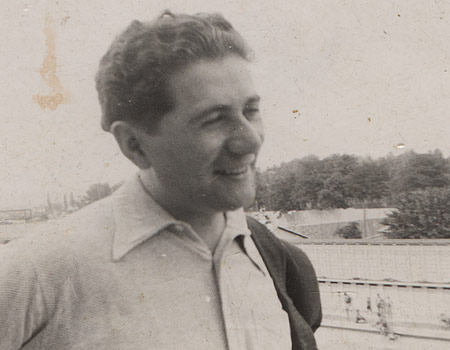
H.W. ("Bill") Katz
America
From Ghetto writing: traditional and Eastern Jewry in German-Jewish Literature from Heine to Hilsenrath
"Upon arrival in New York, Katz (now Henry William Katz, or Bill among friends) again found himself facing the task of acquainting himself with a foreign language and culture, having had to adjust first to the German, then to the French, and now to the American mentality. He soon realised that it would be impossible for him to earn a living by writing in English for the American market."
"With not only his own family but also his parents-in-law to support, he decided to take up work in factories, at first operating a chewing gum machine, later finding employment with a small food manufacturing company of which he eventually became vice-president."
Henry William Katz died in Deerfield Beach, Florida on 6 June 1992.
Works by H.W. Katz
The Fishmans. Viking Press, 1938
Original title: Die Fischmanns.
No 21 Castle Street. Viking Press, New York, 1940.
Original title: Schlossgasse 21: in einer kleinen deutschen Stadt.
- Special Thanks:
- Bernie Gilbert, for the Guiné manifest
- Georg Deutsch, for pointing out the presence of other writers aboard the Guiné
- Yossi Mund for sharing the link to H.W. Katz's birth record.
- Interviews:
- Oral history interview with Bill and Friedel Katz - video interview in 7 part at ushmm.org
- Friedel Katz
- Eve Katz
- References - Books and Articles on H.W. Katz:
- Writer on the Run: German-Jewish Identity and the Experience of Exile in the Life and Work of Henry William Katz. By Ena Pedersen (Conditio Judaica, 33). Tübingen:Niemeyer. 2001.
- Henry William Katz: The life and work of an German-jewish writer and journalist in exile, 1933 - 1945. By Ena Pedersen. Oxford, 1998 (Oxford, Univ., Diss. 1998).
- Vier große galizische Erzähler im Exil : W. H. Katz, Soma Morgenstern, Manes Sperber und Joseph Roth. By Robert G. Weigel. 2005
- Ghetto writing: traditional and Eastern Jewry in German-Jewish Literature from Heine to Hilsenrath By Anne Fuchs, Florian Krobb.
- International Biographical Dictionary of Central European Emigres (1933 - 1945)(NY Public Library).
- Online References - Articles on H.W. Katz:
- Wikipedia (German)
- H. W. Katz in Gera (German, from www.literaturland-thueringen.de)
- References - Books on Varian Fry:
- A Hero of Our Own: The Story of Varian Fry by Sheila Isenberg
- A Quiet American: The Secret War of Varian Fry by Andy Marino
- Surrender on Demand by Varian Fry
